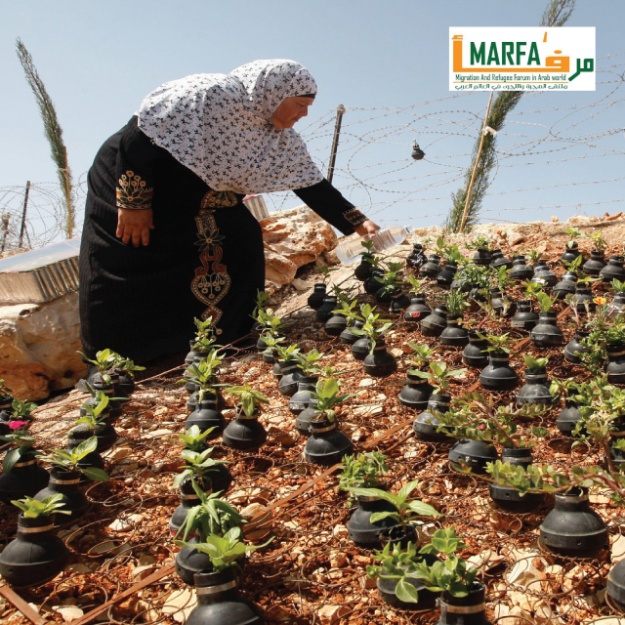Every year on the 1st of May, people all over the world celebrate International Workers’ Day, also known as Labour Day. This year we mark this occasion differently as many workers all over the world are on the frontlines of the response to the COVID-19 crisis. Around the Arab world, migrant and refugee workers are crucially contributing to support our national economies, public services and work in essential, although low income, jobs.
MARFA, the Migration and Refugee Forum for the Arab World, realises that the continuous marginalization of these workers is an issue that has been highlighted many times before. However, it also believes that the COVID-19 crisis can be seen as an opportunity to reflect on this reality, as well as many of the other challenges faced by migrant and refugee workers. On this Labour Day, it is imperative that migrants and refugees are not forgotten from our shared recognition of the efforts being made to combat the pandemic, or omitted from the various social protection frameworks being designed to address the consequences of the crisis.
These workers are employed in the sectors most hit by the crisis: agriculture, domestic work, healthcare, the food industry, construction, tourism, as well as transport and public sector jobs like cleaning. Due to the crisis, these workers have been presented with an impossible decision: they can either continue working, even though the majority of them are not provided with personal protective equipment (PPE), or they face the difficult alternative of no work, no income and no livelihood to sustain them. Evidently, despite the current situation, migrant workers know that their right to remain in a country is linked to their job and, therefore, they cannot risk losing it. While these conditions seem stark, they represent the reality of migrant and refugee workers around the world.
The COVID-19 pandemic has had far-reaching consequences that go beyond its severe effects on health and include economic repercussions due to continued shutdowns and disruptions. Governments have tried to address these effects through stimulus or relief packages to their national economies. In terms of helping workers, many countries have relied on its existing social protection frameworks to do so. Unfortunately, many of these measures have failed to account for or take into consideration migrant and refugee workers. These workers are consequently left in vulnerable positions, with significant proportions of them lacking access to their basic needs. Even those who are eligible to benefit from these programs face another set of challenges such as lack of access to personal documentation that is confiscated by employers, or administrative obstacles related to the issuance or renewal of their residence and/or working permits.
Indeed, this day should represent an opportunity where the spirit of solidarity, which is at the very heart of the Sustainable Development Agenda, is implemented – and we truly ‘leave no one behind.’ The full realization of this principle should guide all efforts in the fight against this pandemic and include all workers in our labour markets, whether they are formal or informal workers. Essentially, informal workers have always faced a number of challenges related to their working and living conditions, access to their various labour rights, as well as being excluded from social protection programs. Due to the COVID-19 crisis these problems have been exacerbated, and an urgent response is needed. While recognizing the health impacts of this crisis, MARFA asserts the need to highlight the working and living conditions of migrant and refugee workers on this special day. For migrant domestic workers, the large majority of whom are women, this crisis represents a challenge from a completely perspective. Due to the crisis, the workload that these workers face is now immense. Regulations related to social distancing and hygiene mean that these workers are constantly working to maintain the highest level of sanitation, in addition to having to respond and fulfill the needs of the members of the household.
Similarly, both agricultural and manufacturing workers are in difficult situation: due to the implemented closures to many of these businesses, some of these workers are unable to continue working, and are thus spending this crisis living in deplorable conditions, without access to sufficient sanitary facilities or other basic needs. On the other hand, a proportion of them continue to work to meet global needs related to medical equipment and food, often without even being provided with the minimum occupational safety and health standards.
The only way to come out of this crisis is to do it together and to ensure that NO ONE is left behind. In these difficult times, the need for inclusive measures that protects the health and livelihood of all workers should be undeniably evident. In these trying times, MARFA extends its thanks and appreciation to all workers who, despite the odds and mounting challenges, strive to continue to do their jobs so we can continue to receive all our essential services.
The Forum also calls on national governments to show solidarity and to take the necessary measures to protect all migrant and refugee workers by:
1. Ensuring that all workers, including migrant and refugee workers, have a right to safe and healthy working conditions, and that those who continue to work with the public must be supplied with free facial masks, alongside other preventive health measures and testing.
2. Continuing to carry out targeted inspections of working conditions in sectors at high risk of labour exploitation and unsafe working conditions in the context of the pandemic and ensuring that all workers are supported in accessing information and redress, without the risk of immigration related legal consequences;
3. Enforcing the inclusion of migrants and refugees who have lost their income during the curfew – including those whose status may currently be irregular – in financial support programs and allowing them to benefit from any other social protection frameworks.


